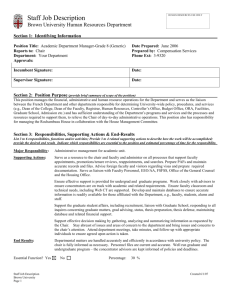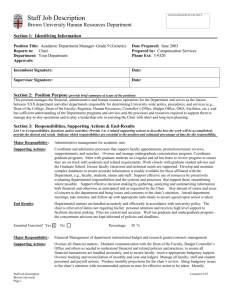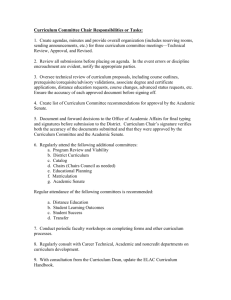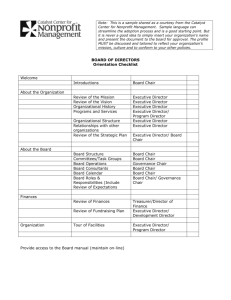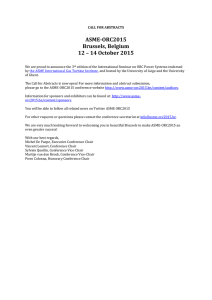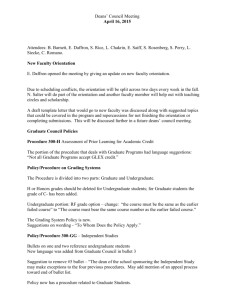iii, department committees - California State University, Northridge
advertisement
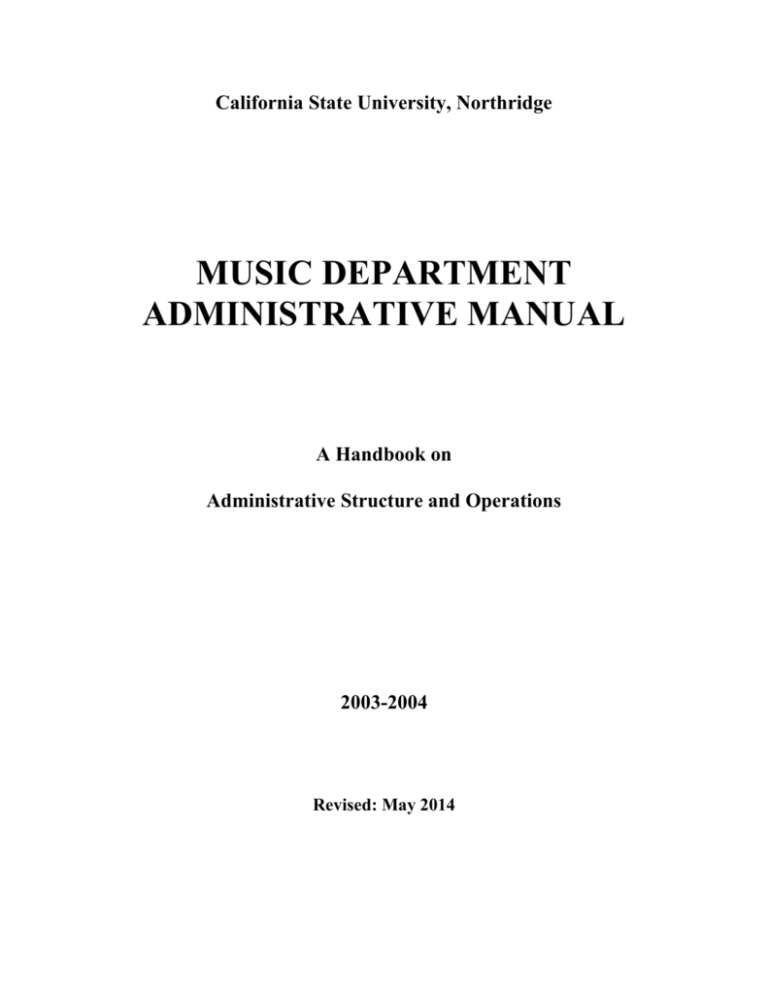
California State University, Northridge MUSIC DEPARTMENT ADMINISTRATIVE MANUAL A Handbook on Administrative Structure and Operations 2003-2004 Revised: May 2014 TABLE OF CONTENTS I Preface 3 II General Department Procedures 4 III Department Committees A. Personnel Committee B. Advisory Committee C. Curriculum Committee D. Ad Hoc Search and Screen Committee 5 5 5 6 7 IV Representative to the College Academic Council 8 V Areas of Instruction A. Options B. Area Coordinators 8 8 8 VI Miscellaneous Departmental Policies 9 VII Department Operations A. Auditions/Juries B. Undergraduate Program C. Graduate Program D. Staff E. Music Technology Laboratory F. Instructional Media Center Operating Procedures 10 10 10 10 10 11 12 VIII Student Policies 13 APPENDIX I APPENDIX II APPENDIX III APPENDIX IV APPENDIX V APPENDIX VI APPENDIX VII Attendance / Participation Policy Excerpts of Roberts Rules of Order Procedures for Evaluating Teaching Competence Criteria for Promotion without the Terminal Degree Definition of Publication or Equivalent Policy on Noon Recitals Memorandum of Understanding 2 15 16 17 19 20 22 23 I. PREFACE This latest version of the Music Department Administrative Manual is a compendium of the changes to department policy proposed by the Shared Governance Committee and approved by the department between August 2002 and March 2003. The recommendations of the Shared Governance Committee increase the number of department committees and expanded their potential membership, with the goal of strengthening the participation of the faculty in the governance and future directions of the department. The Music Department justly enjoys a reputation for excellence in student and faculty achievement both within our university and the larger world of music. The overarching purpose of the committee’s work on procedures for shared governance has been to ensure that the department is able to elicit and build on the perspectives of the entire faculty and to depend on each member of the faculty to accept a share of the responsibility for the department’s operation, in fulfillment of the department’s role within the Mike Curb College of Arts, Media and Communication and California State University, Northridge. As an example, one issue Music faces is the challenge of increasing students’ progress toward graduation while continuing to foster their accomplishments in the discipline of music amidst likely contractions in the university’s budget over the next several years. The Shared Governance Committee is confident that encouraging all members of the faculty to actively participate in defining and creating the department’s future will make it possible for the department to sustain its current strength and forge a common blueprint for continuing outstanding achievements. Because the Shared Governance Committee and the department as a whole have committed substantial time and energy to the revisions of this Administrative Manual, we urge all members of the faculty to review its provisions on a periodic basis and accept responsibility for their on-going implementation. The expanded committee structure will depend for its effectiveness on appropriately open and transparent deliberation, with distribution of agendas prior to meetings and of notes following meetings. All committee meetings, with the exception of the Personnel Committee, are open meetings and all members of the department are welcome to attend. (Some portions of Advisory Committee meetings, for special reasons and upon vote of the committee, may be designated as closed). To ensure appropriate exchanges of information about College and University direction and context, the committees also will be responsible for timely and open consultation with the department chair. When the Shared Governance Committee began its work, the Dean proposed to the department that we commit ourselves to operating within a “Shared Code of Conduct” to encourage honesty, openness and mutual respect as we undertook our discussions. We strongly believe that such an approach is essential to the effectiveness of meaningful shared governance in the department. To that end, we recommend the adoption of the following commitments to collegial behavior: 3 As members of the Department of Music, we will be open to shared problem solving; demonstrate self-awareness, truthfulness and honesty; be willing to let go of prior assumptions; respect one another and address issues rather than personalities; listen actively to others’ points of view; appreciate our differences and accept alternative ways of solving problems; make every attempt to resolve conflicts directly among the parties involved prior to taking the issue to the chair or the advisory committee or others; respect confidentiality as appropriate to each situation; accept appropriate ownership of decisions; observe scheduling deadlines out of respect to colleagues and in recognition of the complexity of our department. From the Shared Governance Committee – January 2003 II. GENERAL DEPARTMNET PROCEDURES Voting: Ballots will be distributed by the Chair’s office and done online via confidential survey. The results will be viewed by the Chair and the Chair of the Advisory Committee and announced to the faculty. If a paper ballot is desired it will be distributed by the Chair’s office and counted by the Chair of the Advisory Committee and the Department Chair with all members of the faculty invited to observe if they wish. The ballot will list all nominees and the faculty will then be able to vote for the number of openings available for election to the committee. (The ballot will indicate the maximum number of candidates to vote for). Committee Elections: Committees are elected from the full-time faculty. The faculty will be given a 3 day time frame to either self nominate or agree to be nominated for the committee. This can be done via email or in writing to the Department Chair. After the 3 days the ballot shall be prepared in a timely fashion for distribution to the faculty. (See page 4 for specific regulations affecting the Personnel Committee). Late in the Spring semester (or as soon as possible after the election for the College Personnel Committee), the Personnel Committee and then Curriculum Committee will be elected for the following year. At the beginning of the Fall semester, the Advisory Committee will be elected for the year. Search Committees will be established as soon as possible after a full-time faculty recruitment has been authorized. Committee Reporting: All committees will report to the department on a regular basis, as appropriate to their function. When a committee has developed a proposed policy or procedure on an issue, it will request time on the agenda of the next department meeting for the full faculty’s consideration. Faculty Meetings: Agendas for department meetings should be ordered in such a way as to provide maximum opportunity for discussion of significant issues and of policy 4 proposals from department committees. Whenever possible, committees will submit proposals for changes in existing policy to all faculty prior to the scheduled faculty meeting to allow for more informed discussion. For major policy changes, committees are required to transmit descriptions of the proposed changes by email at least 48 hours prior to the meeting at which a vote will be taken. Resolution of Conflicts: Faculty and staff should make every effort to work directly with each other to resolve issues. If resolution does not result, the parties may approach the Chair, who will consider the issue confidentially and make a decision. If the parties are still dissatisfied, the issue then be presented to the Dean, whose decision will be final. III, DEPARTMENT COMMITTEES A. Department Personnel Committee: 1. A five member departmental Personnel Committee is elected each Spring from tenured faculty members of advanced rank who are not eligible for promotion. Each faculty member will vote for five (5) colleagues. Members receiving the most votes are elected to serve for one academic year. The ballots will be issued by the Chair’s Office, and counted by the Chair of the Advisory Committee with all members of the faculty invited to observe if they wish. 2. The Committee shall elect its own chair. 3. The Committee considers and recommends on full and part time Personnel matters as described in the CSUN Administrative Manual, sections 600 and 700. Additionally, the committee observes the following department policy documents: (found in appendices III, IV & V) a. Criteria for Promotion without the Terminal Degree b. Procedures for Evaluating Teaching Competence c. Definition of Publications or Equivalent 4. Appointment to advanced rank must be approved by the majority of the tenured faculty. 5. The Committee shall act as the Department Professional Leave Committee B. Advisory Committee: 1. Election to fill vacancies on a three member Advisory Committee will take place early each fall. Of the three members one will have tenure. Probationary faculty are eligible to serve. Names of faculty who are available to serve will be listed on a ballot issued by the Chair. Vacancies on the committee will be filled by preferential ballot. 5 2. Vacancies will be filled on a two-year basis Faculty may stand for election to successive terms on the committee. 3. The committee shall elect its own chair each year. 4. The Advisory Committee will be available for consultation with the chair on the establishment of the Department’s annual budget and other budgetary issues which may arise. The committee may develop and propose to the department policies and procedures in areas of departmental functioning other than those under the direction of the curriculum committee. It will consult on an as-needed basis with the department chair on proposed full-time faculty hires and make its recommendations known to the music department faculty at large. Faculty members may also propose additional agenda items which may be taken up by the Advisory Committee as its discretion. 5. On all issues listed in item 4, the committee shall provide the department with advance notice (preferably an agenda) and minutes of its meetings. These meetings will be open to other faculty in the department who wish to attend. 6. At the request of the department chair regarding decisions which lie within his/her administrative responsibility, or at the request of individual faculty, the committee will provide consultation on other issues which could benefit from the committee’s deliberation and advice. At the discretion of a majority of the committee, attendance at all or a portion of such meetings may be limited to the committee and the department chair or the faculty member(s) requesting consultation. Appropriate confidentiality is expected of all participants in these meetings. C. Curriculum Committee: 1. The curriculum committee shall consist of 5 members, the assessment coordinator, the graduate advisor and three faculty elected by the department. The Graduate Advisor will automatically be a voting member of the committee and the Undergraduate Advisor will automatically be an ex-officio member. As soon as possible three faculty will be elected to 2year or 1-year terms (top two vote getters will be elected for 2 year terms and the next one will be elected to 1 year terms). In future all new members will be elected to staggered 2 year terms. 2. The curriculum committee will be elected immediately after personnel committee. Elections will take place each spring for the upcoming year. Probationary, tenured and full-time lecturer faculty are eligible to serve. Names of faculty who are eligible and available to serve will be listed on a ballot to be issued by the Chair. 6 3. The term of service on the curriculum committee shall be two years except for the Graduate Advisor who will serve continuously. 4. The committee shall elect its own chair each year. 5. The curriculum committee will provide oversight of the department’s graduate and undergraduate programs. It will assist in assuring the compliance of the programs with the university and accreditation standards. It will provide a setting for faculty from various areas to discuss and evaluate current curricular offerings. The committee will review proposed experimental courses and new or revised courses or programs and make recommendations to the department. The committee will periodically review department and all-university enrollment trends and student feedback to consider the implications for the undergraduate and graduate programs. As needed, the committee will propose changes to current admission policies within the department and oversee guidelines for culminating experiences. The committee will review and make recommendations to the department and the Chair on decisions pertaining to student-initiated issues and concerns. Any member of the faculty may propose items for the committee’s consideration. 6. University, college and department initiatives that pertain to undergraduate and graduate matters may be referred to the committee for its review and recommendations. 7. The committee shall provide the department with advance notice (preferably its agenda) and minutes of its meetings. Meetings will be open to other faculty in the department who wish to attend. D. Ad Hoc Search and Screen Committees 1. Ad hoc search and screen committees will be established as soon as possible after the department has been authorized to recruit new full-time faculty. These committees will have three elected members from tenure track faculty members. Nominations will be solicited from the faculty to serve. 2. Search and Screen committee will follow the procedures in the university’s “Manual for Procedures for Search and Screen Committees for Full-Time Faculty Positions.” E. Special Circumstances 7 When there are not enough faculty volunteering for any committee, those faculty eligible to serve on the committee will be placed on a ballot and voted upon by the faculty. F. IV DEPARTMENT REPRESENTATVE TO THE COLLEGE ACADEMIC COUNCIL The Curriculum Committee will select one of its members to serve as the department’s representative on the College Academic Council. The member selected should be available to serve the standard two-year term on the Academic Council. V. AREAS OF INSTRUCTION A. Options 1. Breadth Studies 2. Music Industry Studies 3. Music Education 4. Music Therapy 5. Strings 6. Winds 7. Percussion 8. Keyboard 9. Guitar 10. Vocal Arts 11. Composition/Theory 12. Commercial & Media Writing 13. Jazz B. Area Coordinators (limited to full-time faculty) 1. Teaching one course regularly in an area will constitute membership in that area. Teaching “regularly” means one course each semester. 2. Only those people teaching more than one course in an area are eligible for election. 3. Each area elects its own coordinator on a preferential ballot as described in Robert’s Rules of Order. 4. The term of office is three years. 5. Functions of the Area Coordinator: a. To oversee the area, recommending procedures and changes of policy when necessary. 8 b. Scheduling: 1) Arrange and administer auditions, juries, and special examinations. 2) Arrange for specific concerts, lectures, and demonstrations. c. Instructional needs: 1) Order and maintenance of supplied and equipment 2) Coordinate textbook selections. d. Staffing: 1) Prediction of needs for faculty and bringing qualified potential faculty to the attention of the Chair or the Advisory Committee 2) Recruitment and review of graduate assistants to be contacted by the Chair of the Department. e. Recommendation for new curricula or revisions of existing curricula as appropriate. VI MISCELLANEOUS DEPARTMENT POLICIES Travel Full-time faculty members presenting a paper, lecture or recital at a conference are allocated $500.00 per academic year. Full-time faculty members attending a conference but not presenting or on a governing board, can be allocated $300.00. Part-time faculty members are allotted $100.00 per academic year. Loan of Instruments to Faculty Members All state-owned instruments available for checkout will be returned and checked in at the end of the semester. At the beginning of each new semester, students will be given first priority in checking out state-owned instruments for instructionally related activities. Teaching Assignments After consultation with the members of their groups, area option coordinators shall propose the class schedule and specific teaching assignments of their members (including FERP faculty members and part-time faculty with multi-year appointments). Due consideration and effort shall be made to incorporate class assignment requests put forth by faculty members, including part-time faculty. These proposed schedules should be followed whenever possible. In cases where the chair of the department feels that changes need to be made, reasons must be given to the area/option coordinators and to the individual faculty members involved. The chair’s request for consultation must be responded to in a timely manner. 9 Part-Time Teaching Appointments Any and all hiring of part-time instructors, including applied faculty, must be made in consultation and with the approval of all areas affected. Area Coordinators for Core/GE Scheduling The department will elect one of its members to serve as area coordinator for general education courses and the courses in the core which are not within another area. The department chair will consult with the “Core/GE” area coordinator in the same manner as with other area/option coordinators. VI. DEPARTMENTAL OPERATIONS A. Auditions/Juries Auditions are held 4 times a year at dates determined by the faculty. For fall entrance, scholarship auditions are usually held in February and March, for spring entrance, auditions are held in November, auditions are also held in late August for students who are admitted after spring auditions are complete. Auditions are coordinated by the Undergraduate Advisor. Juries are held final exam week during the time the ensemble meet for each instrumental/voice area. Each area coordinator is responsible for setting up the day/time of the juries. B. Undergraduate Program Lea Antone is the undergraduate student advisor. Area Chairs or the student’s private lesson teacher serve as advisor. Advisement is mandatory for all music majors each semester. The undergraduate advisor prepares graduation check on the year prior to anticipated graduation. The “Grad Check” is reviewed by Area Coordinators and the associate co-chair of the department. C. Graduate Program The graduate coordinator in music is responsible for advising all graduate students and preparing a program of study in consultation with the appropriate area chair. Responsibilities include coordination with the Graduate Studies Office on policies and procedures relevant to the program. Advisement is mandatory for all graduate students each semester. D. Staff Administrative Analyst- Bennie Say Provides administrative analysis and continuity of operations to assist Department Chair in the areas of budgets and Department functions. Administers Departmental purchasing functions; coordinates Applied Music program. Coordinates budgets for the Music Department (State general, trust, foundation and corporation). Administrative Support Coordinator- Jill Price Coordinates textbook orders, office supplies, inputs schedule of classes into SOLAR, prepares minutes of Department meetings and assists with curriculum 10 review/revision. Supervises telephone/reception area and student assistants and responds to inquiries made by faculty, students and the general public. Maintains room schedule and mail distribution. Undergraduate Advisor- Lea Antone Coordinates student advisement, new student and scholarship auditions, information mailings and recruitment. Responsible for preparation of Departmental graduation evaluations in conjunction with area coordinators and Department Chair and development of information handbooks for student use. Public Relations/Concert Program Office Coordinator- Kyle Stephens Maintains annual schedule of Music Department events, (Faculty Artist Series, Visiting Artists and Ensemble Concerts). Manages all fiscal preparation for concerts and recitals; coordinates these with Theater Policy of the Department of Theater. Ensures that all presentations are made in the best available educational setting. Oversees expenditures of IRA funds for the Program Office. Instructional Support Technician- Karla Torres-Vazquez Scheduling and management of Junior, Senior and Graduate recitals. Supervises set up and personnel for all concerts and recitals. Responsible for instrument check-out, equipment repair and maintenance, facilities, security, and Department vehicles. Maintains key distribution. Electronic Technician (10 month appointment)- Phil Calvert Supervises audio services, laboratory for computers and technology in Music. Orders installs, and maintains electronic equipment for the Music Department. Records all Department ensemble concerts and maintains files. Instructional Support Assistant- vacant Responsible for supervision of the Instructional Materials Center/ Music Library. Assists faculty and students in checking out recordings, scores etc. Supervises student assistants and maintains all files on a computer database. Piano Technician (half-time position)- Jim Karukas Tunes, repairs, and maintains department pianos; inspects new instruments Staff Accompanists (10 month appointments)- Jackie Koo and Suzanne Recer Accompany Music Department classes, including monthly studio classes, faculty recitals, and concerts E. Music Technology Laboratory 1. The Music Technology Lab is for use of all music students and faculty, who may avail themselves of a variety of applications, including ear training, notation and sequencing software. 11 2. Users must bring their own disks or memory sticks and are responsible to make sure that their disks are virus-free. 3. Copying of programs installed on the computers is strictly prohibited. 4. No eating, drinking, or smoking is allowed in the Music Technology Lab. F. Instructional Media Center Operating Policies Check-out Policy – Faculty: 1. Recordings and scores are normally checked out for a period of one week. Faculty members are strongly encourages to observe this time frame, although it is recognized that some materials cannot be returned within that period. In such cases faculty should bring the materials in for renewal on a weekly basis. 2. Items may be checked out on semester loan only when the IMC has multiple copies. Check-out Policy – Graduate Students: 1. Graduate music majors may check out recordings and scores needed for seminar presentation or research. All above policies apply, although there is no provision for a semester loan. 2. Graduate students must identify themselves as such, and present student ID, for check-out privileges. Check-out Policy – Undergraduate Students: Undergraduate students are allowed to check out recordings or scores only with the written permission of a faculty member, for a specific class assignment. Check-out period is a maximum of five days. In giving the required written permission, the faculty member concerned assumes the responsibility for the return of materials. Purchasing: Faculty members may request purchase of a specific item for the IMC that is needed for a specific class, performance, or related purpose. Within the limits of funding availability, the IMC coordinator will process this purchase. Chamber Music and Opera Vocal Scores: To be checked out to a faculty, graduate students, or undergraduate students with written permission, for purposes of performance classes and performance during the current semester. Music is to be returned at the end of the exam or performance period for which it is checked out. Coaches and their student assistants are responsible for maintaining proper records of music distribution in their courses. Nevertheless, students are responsible for each item in their possession. 12 Orchestra and Band Music: To be checked out to faculty or orchestra student assistants for purposes of orchestra classes and performances. Music is to be returned at the end of the exam and/or performance period for which it is checked out. Policy is the same for no. 5 above. Choral Music: To be checked out to faculty, graduate conducting students preparing recitals, student assistants of faculty conductors, and students enrolled in upper division or graduate choral conducting classes when assigned by the instructor. Policy is the same for no. 5 above. Sets of Scores: May be checked out by faculty for use in class. They are not to be issued or reissued to students. Faculty should recommend student purchase of scores which classes need on a long-term basis. Reference Materials: The reference books in the IMC are not to be checked out. All may avail themselves of the works, but they must be used in the IMC. Reserve Materials: Faculty wishing to place materials on reserve may do so at any time. They may also place personal copies of scores or recordings on reserve, and are assured of their security. Hours Hours for the IMC are Monday – Friday; 8:00am – 5:00 pm. The IMC is not open on weekends. Security No persons, except IMC staff, are allowed behind the front counter of the room. VIII. STUDENT POLICIES Recital Juries: The policy on Student Recital Juries is published in the Department of Music Undergraduate Handbook. 13 Ensemble Requirement: The ensemble requirement is articulated generally in the University Catalog under Special requirements of the Music Major and more specifically in the Department of Music Undergraduate Student Handbook. Enrollment in 2 units of ensemble is a co-requisite each semester in which a student is enrolled in individual lessons. Students must audition for the appropriate ensemble to their applied area and be placed in a conducted ensemble each semester. Students who do not audition for ensembles and/or are not enrolled in 2 units of ensembles will not be eligible for lessons that semester. Music Stand Policy: Students must provide their own music stands for individual practice and ensemble rehearsals. Department-owned music stands are provided for use in classrooms, teaching studios and for performances of departmental ensembles. Recognized Student Organizations: CSUN Guitar Quartet – Steve Thachuk, advisor Media Composers Club – Elizabeth Sellers, advisor Music Educators National Conference (student chapter) - Mary Schliff, advisor Music Therapy Association of Northridge – Ron Borczon, advisor Northridge Musicians Association – Diane Roscetti, advisor Pi Kappa Lambda, Gamma Kappa Chapter –Julia Heinen, advisor New Directions Composers Group – Liviu Marinescu, advisor Sigma Alpha Iota – Julia Heinen, advisor Student National Association of Teachers of Singing – Deanna Murray, advisor Each organization must have advisors from the Music Department Faculty 14

